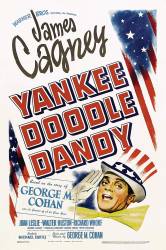Revealing mistake: In one of the last scenes of the movie when the Younger Generation visits George they drive into the scene in their old jalopy Chevrolet. The only problem is, from the front end shot, anyone can see that the body moldings and lines of the car body don't line up with the hood. Also the gas filler cap is visible, in the same shot, on top of the cowl right under the windshield, revealing they hung the front end of a Chevrolet on the front of a Model "A" Ford Deluxe Phaeton. The only car ever produced with a gas tank filler on the cowl right in front of the windshield - Model "A" Fords. Chevys had too much wood in them during the '20s & '30s. They all ended up being infested with termites. So when this movie was made just 10 or 11 years after they were all produced, no Chevys could be found for filming. Chevy Emblem is visible on the radiator shell, but it's a Ford Model "A". Also the four distinctive vent doors available on Chevys, from the day, are visible instead of the louvers of a Model "A" Ford hood. The Cowl Lamps (Parking Lights) are also Model "A". (01:52:00 - 01:54:10)
Visible crew/equipment: In the final musical number "Strictly off the Record", you can clearly see the shadow of the microphone boom during part of the number.
Continuity mistake: In the dressing room scene just before Mr. Albee's visit, as Jerry Cohan is talking he wraps a scarf around his neck. He leaves one end outside of the dressing gown, but in the next shot, both ends are tucked in.
Factual error: Although quite typical for biopics of this era, certain aspects of Cohan's life are glossed over. The movie shows him in a lifelong marriage to his first love. However, he was in fact married in 1899 to Ethel Levy, and after their divorce in 1907 he married Agnes Mary Nolan, who remained his wife until Cohan's death in 1942.
Continuity mistake: When George is chopping wood, his coat is either buttoned or unbuttoned, depending on the shot.
Factual error: The newspaper headline about the sinking of the Lusitania has a photograph of the ship with only two funnels. The Lusitania had four.
Factual error: In the movie, Cohan's play Popularity, the sinking of the Lusitania, and America's entry into WWI are depicted as occurring in rapid succession. However, Popularity was on the stage in 1906, the Lusitania was sunk in 1915, and America entered the war in 1917.
Factual error: In the scene from the play, "George Washington, Jr.," a troop of boy scouts is shown on stage. The play opened in 1906, but the boy scout movement was started in 1908 in the UK, and the Boy Scouts of America did not exist until 1910.
Factual error: George tap dances down the stairs after visiting the President in the Oval Office. But the Oval Office is on the ground floor of the White House.
Factual error: At the end of the movie, Cohan is shown performing in "I'd Rather be Right," which was a real play. However, one of the lines in the performance is "and now they've taken France." The play ran on Broadway in 1937, but Germany did not invade France until 1940.
Factual error: The movie has Roosevelt presenting Cohan with the Congressional Medal of Honor. Cohan was actually presented the Congressional Gold Medal, which is the nation's highest civilian award. The Medal of Honor is the highest military decoration, awarded for heroism above and beyond the call of duty in combat.





